ARTICLE AD BOX
24 minutes ago
By Glenn Campbell, Political editor, BBC Scotland

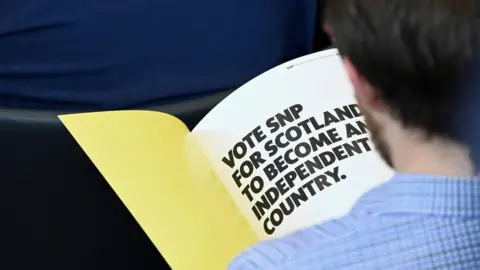 Reuters
Reuters
I can remember when this was going to be "the" independence election, according to the SNP.
It’s not that long ago.
In November 2022, the then first minister Nicola Sturgeon proposed using the next election as a substitute referendum.
Her idea was that if the SNP (and possibly other independence supporting parties) got over 50% of the vote, that would mean Scotland had voted to leave the UK.
There were a couple of problems with this approach. Big ones.
The first was that UK-supporting parties did not accept it as a legitimate way of deciding the issue because a general election involves debate about so many other matters.
And secondly, the SNP had fallen just short of getting 50% in their best ever election result. That was in 2015, when they won all but three of Scotland’s 59 seats.


After her sudden resignation as SNP leader and first minister in February 2023, Nicola Sturgeon told me she thought her plan could have worked and that she would not have bet against herself succeeding.
The reason the SNP got to this point was frustration. They kept winning elections and the UK government kept refusing another referendum.
The government at Westminster argued the democracy of the 2014 vote on independence should be allowed to stand.
The SNP Scottish government went to the UK Supreme Court to establish the legal position.
The judges boxed them in by clarifying that there could only be another referendum with UK government consent.
It remains unclear what it would take to secure that approval - except perhaps the SNP winning a majority of the seats at Holyrood, which was the trigger for the last vote.
So the party goes into this election with line one of their manifesto claiming that a vote for the SNP is a vote for independence without the faintest idea of how to turn that into reality.

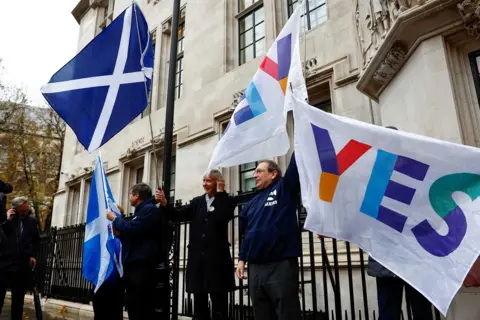 PA Media
PA Media
The Scottish government went to the UK Supreme Court to establish the legal position on an independence referendum
They say winning a majority of Scottish seats at Westminster should be enough to open negotiations for a referendum.
They have won that level of support at the last three UK elections. Achieving the same success seems more in doubt this time if the trend in opinion polls is to be believed.
Independence still has substantial support among the Scottish public but achieving it remains somewhere over the rainbow.
It is not the predominant issue in this campaign, even though both nationalist and unionist politicians may, at times, use it to motivate their core supporters.
There are arguably far more pressing matters that voters want politicians of all parties to focus on - like the cost of living crisis, lengthy waiting times in the NHS, standards in education.
Many of these issues are under control at Holyrood, where the SNP has been in government for the last 17 years.
The SNP argues that it has not had enough resources from Conservative-led governments at Westminster over the last 14 years.

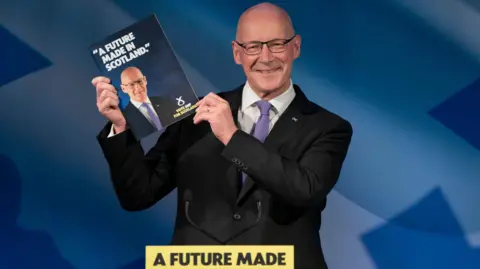 PA
PA
John Swinney launched the SNP's manifesto in Edinburgh
UK ministers would point out that the Scottish government has never had more cash from the UK treasury (albeit that sum has been devalued by the recent spike in inflation).
Ministers in Edinburgh have also used devolved taxes to top up their spending.
Is it possible that they could have done better with the resources and decision-making powers that they have?
Is it possible that they have dodged some tough decisions so as not to upset the coalition of support they have built for independence?
That coalition appears to be under pressure anyway.
There are multiple options for independence supporters at election time. There is Alex Salmond’s Alba party or the Scottish Greens, who until recently shared power with the SNP at Holyrood.
The SNP has been an election-winning machine since the 2014 referendum. It has won every national election by persuading much of the block of independence-minded voters to stick with them.
This is the first major election, where the trend in opinion polls suggests that strategy is no longer working.

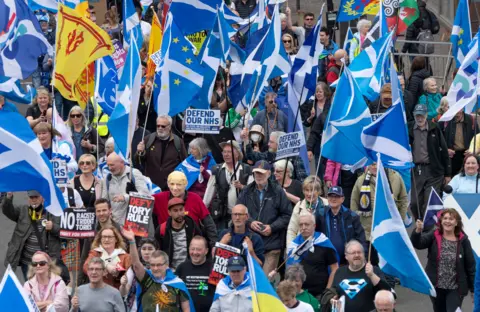 PA Media
PA Media
For some it may be internal party friction and a lack of delivery on independence that has turned them away.
For others, it may be problems in the public services, a police investigation into the SNP’s finances and the loss of Nicola Sturgeon as party leader that have put them off.
Political gravity tends to pull all parties down eventually.
As one senior SNP figure told me, the public is “pissed off” with the governments at Holyrood and Westminster and want something different.
That’s why the SNP is putting so much effort into trying to persuade voters that Labour represents the same spending constraint as the Conservatives.
To illustrate that point SNP leader John Swinney highlights the two child benefit cap, which his party wants removed - a commitment Labour has said it cannot afford to make.
Labour’s Scottish leader, Anas Sarwar, said on Tuesday that he hoped his party’s plans to grow the economy might allow more generous spending over time.

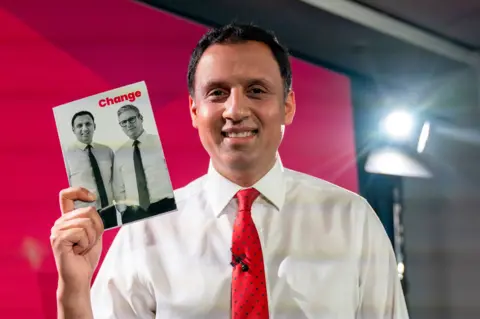 PA Media
PA Media
Labour’s Scottish leader, Anas Sarwar, launched their manifesto on Wednesday
Labour appears to have regained credibility in Scotland, winning a stunning victory in the Rutherglen and Hamilton West by-election last year and pressing the SNP hard for supremacy in recent opinion polls.
This is the SNP’s toughest election since 2010 - the last time Labour won in Scotland.
This campaign is about damage limitation for the SNP leader John Swinney and he is trying to offset some potential losses to Labour in the central belt by targeting Conservative seats in rural Scotland.
The SNP expect this to be a painful election. The only consolation for John Swinney is that he only had a couple of weeks as party leader to prepare.
It may be that his predecessors, Humza Yousaf and Nicola Sturgeon, take much of the blame for any setbacks.
It is of course the case that he was part of team Sturgeon as her deputy first minister throughout her entire time in office.
After this vote is over there are less than two years until the next major election in Scotland - the Holyrood contest in 2026.

 6 months ago
22
6 months ago
22








 English (US) ·
English (US) ·